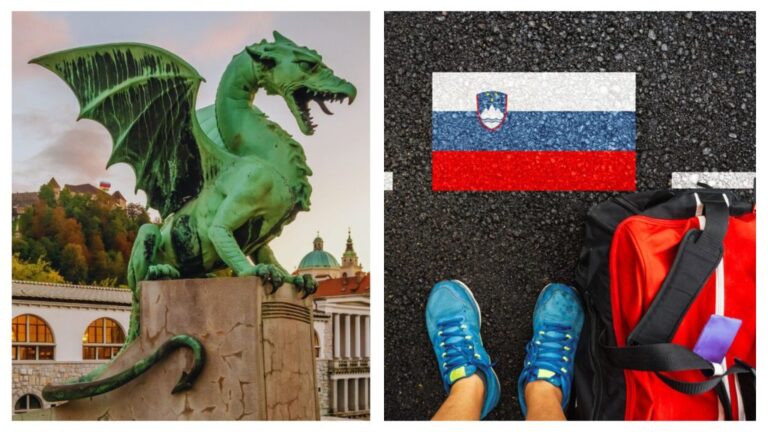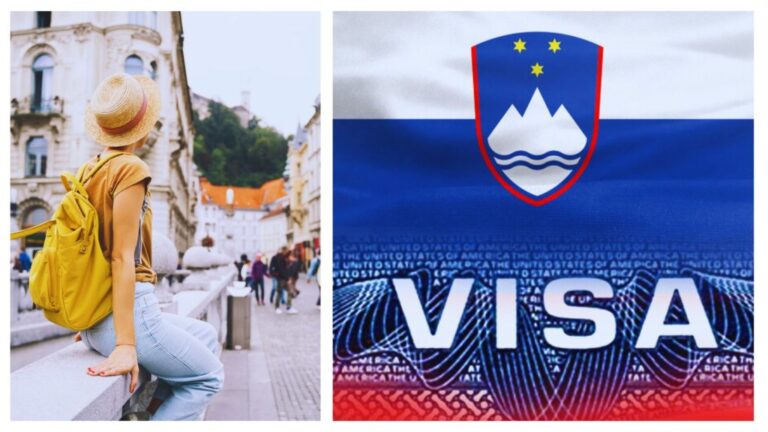Slovenia digital nomad visa: How to get it?
Work remotely from this country! Learn about the procedures, costs, advice, and alternatives to the digital nomad visa in Slovenia.
Do you want to travel to Slovenia and don’t know if there’s a digital nomad visa available? Don’t lose hope of being amazed by the architecture of this country in the heart of Europe. In this guide, we will tell you about the current status of the digital nomad visa in Slovenia and the alternatives that allow you to settle here without complications.
If you’re looking for solutions, Holafly has them for you. Find out shortly about requirements, procedures, costs, and personalized consultancy recommendations that will help you step-by-step to travel legally to Slovenia and live for a prolonged period.
Does Slovenia have a digital nomad visa?
The digital nomad visa in Slovenia is still not a reality as it is in some of its European neighbors, including Croatia and Estonia, but there are other ways to stay for an extended period in the country while working remotely.
So far, the government has not announced plans to create a digital nomad visa in Slovenia nor has it revealed any clear intention to develop this policy in the near future. Therefore, there is no official regulation governing this type of visa or an estimated launch date.
Portugal and Spain are also progressing in this area, but Slovenia seems to be focused on other administrative priorities, although it wouldn’t be surprising if the growing interest of digital nomads in Slovenia leads to changes in the coming years.

What are the alternatives to digital nomad visas in Slovenia?
Slovenia doesn’t have a specific visa for digital nomads, but don’t rule out this destination from your list because there are several options that can make your stay easier. These alternatives include short and long-term visas, as well as permits designed for entrepreneurs or freelancers.
Schengen Tourist Visa
This is the simplest and quickest option if you’re planning to visit Slovenia as a digital nomad. You should know that it’s not specifically designed for remote work, but you’ll be able to enjoy the country while working with your clients or businesses outside Slovenia.
With this visa, you can stay for up to 90 days in a 180-day period in Slovenia and other Schengen Area countries. If you’re planning to move between different European destinations as part of your nomadic lifestyle, this is a very practical option.
Why is it convenient for digital nomads?
- Flexibility: Perfect for exploring Slovenia without committing long-term.
- Low cost: The process is affordable, and the requirements are less complex compared to longer visas.
- Access to the Schengen Area: You can move freely through other European countries during your stay.
Features of the Schengen Tourist Visa
- Duration: Up to 90 days within 180 days.
- Main Requirements:
- Valid passport for at least three months after the planned departure date.
- Health insurance that covers at least €30,000 ($32,400).
- Proof of sufficient financial means (generally €70 ($75) per day of stay).
- Return tickets for entering and exiting the Schengen Area.
- Processing Fee: Approximately €80 ($86).
- How to apply: Through the Slovenian embassy or consulate in your country of residence. The process includes completing an online form, gathering documents, and attending an interview.

Long-Term D Visa
The D visa is for you if 90 days aren’t enough to enjoy Slovenia. Keep in mind that this visa is intended for specific purposes such as study or work, but it’s also a great option if you can justify your stay as a remote worker.
Why is it convenient for digital nomads?
- Long stays: Allows you to stay for up to a year, enough time to settle in Slovenia and work remotely peacefully.
- Solid legal foundation: Suitable if you’re looking for more stability and want to avoid frequently moving between countries.
- Access to local services: You can register in the healthcare system and have better access to local resources like property rentals.
Features of the D Visa
- Duration: From 90 days to a year, with the possibility of renewal.
- Main Requirements:
- Justification of your prolonged stay (remote work, study, etc.).
- Valid health insurance in Slovenia.
- Proof of sufficient income to cover your stay (at least €1,000 ($1,080) per month).
- Registration of residence in Slovenia.
- Processing Fee: Estimated €77 ($83), although it may vary.
- How to apply: Application must be submitted to the Slovenian embassy before entering the country. Requires completing a form, submitting original documents, and justifying your activity.
Secure your stay, but don’t forget about the connection. The visa allows you to live legally in Slovenia, but a stable connection is essential for your remote work. That’s why we recommend Holafly’s monthly plans, with unlimited data or 25 GB that you can share with other devices, and it works in over 160 countries worldwide.
You can also use the Holafly eSIM for Slovenia to have unlimited data for the days you need while staying in the country.
Important: If you are a frequent traveler and want to stay connected without worrying about expensive roaming or looking for a new SIM at every destination, Holafly’s subscription plans are for you. With a single eSIM, enjoy internet in more than 170 countries for a fixed price and no surprises on your bill. Travel without limits and connect easily and securely! 🚀🌍

Freelancer Residence Permit
If your nomadic lifestyle is more focused on entrepreneurship, this option is for you. This permit allows you to register a business in Slovenia or work as a freelancer, providing a more stable alternative for those with consistent income from international clients. The long-term visa requires more initial commitment, such as creating a business, financial plans, and demonstrating consistent income.
Why is it convenient for digital nomads?
- Stability and formality: Offers a clear legal framework to live and work in Slovenia long-term.
- Business opportunities: Lets you establish your company in the heart of Europe and benefit from access to the European market.
- Flexible duration: You can renew your permit, making it a semi-permanent option.
Freelancer Visa features
- Duration: One year, renewable.
- Main Requirements:
- Register a company in Slovenia or prove you’re working as a freelancer for international clients.
- Business plan showing economic viability.
- Proof of stable and sufficient income (at least €1,200 ($1,296) monthly).
- Health insurance and residence registration in Slovenia.
- Processing fee:Varies depending on the type of business registered, but initial costs can be around €300 ($324).
- How to apply:
- Register your business in the Slovenian commercial system.
- Complete the application at a local administrative office in Slovenia.
- Submit all required documents, including proof of residence and income.

Similarities and differences of visas in Slovenia
Each of these visas has specific advantages depending on the duration of your stay and the nature of your remote work. If you’re looking for a simpler solution, the Schengen tourist visa is ideal for short stays. For longer periods, consider the D visa or the freelancer residence permit, although these require more detailed planning and economic requirements.
Remember that the required documentation for all procedures includes a valid passport, proof of income, and health insurance that covers your entire stay in Slovenia. Here we detail their similarities and differences:
| Aspect | Schengen Tourist Visa | Long-Term D Visa | Freelancer Residence Permit |
| Maximum Duration | 90 days in 180 days. | 90 days to 1 year (renewable). | 1 year (renewable). |
| Allowed Purpose | Tourism, personal activities (no local employment) | Study, remote work, business activities. | Freelance work, own business. |
| Common Requirements | – Valid passport. – Medical insurance (minimum €30,000 ($32,400)). – Proof of financial means (€70/day ($75/day)). – Return ticket. | – Valid passport. – Medical insurance. – Proof of activity. – Proof of minimum income (€1,000/month ($1,080/month)). – Proof of residence. | – Valid passport. – Company registration or proof of self-employment. – Medical insurance. – Stable income (€1,200/month ($1,296/month)). – Proof of residence. |
| Specific Documents | – Application form – Accommodation proof – Invitation letter (if applicable) | – Acceptance letter or contract – Criminal record certificate – Proof of economic stability | – Business plan – Proof of business registration in Slovenia – Client proofs |
| Processing Fee | €80 ($86) | €77 ($83) | From €300 ($324) (depending on company registration). |
| Where to Apply | Slovenian embassy or consulate | Embassy or consulate (before traveling) | Local administrative office in Slovenia |
| Processing Time | 15-30 days | Up to 30 days | Variable, depending on case complexity |
Comparison of the most convenient visas for a digital nomad in Slovenia
Sanctions for working remotely without the proper visa in Slovenia
If you decide to work remotely in Slovenia, it’s crucial to do so within the legal framework. Violating regulations could lead to severe penalties, such as immediate deportation and restrictions on re-entry into the country. These measures aim to protect the local economy and prevent misuse of temporary permits.
The documents and procedures recommended in this article, while not specifically for a digital nomad visa in Slovenia, show the most feasible options for working remotely without legal complications that may affect your experience.

Visas for remote work and local companies in Slovenia
The Schengen tourist visa allows remote work as long as your income comes from clients or employers outside Slovenia. It’s not suitable for working in local companies or participating in the country’s economy. The D long-term visa is also flexible if you don’t generate local income. On the other hand, the freelancer residence permit is the most viable option if your plans are to offer services within Slovenia or work for local clients, as it legally enables you to generate income in the country.
Working for a Slovenian company with a tourist or long-term visa without a work permit can have serious consequences, such as significant fines, deportation, and a ban on entering Slovenia for a period that may extend for several years, as well as legal problems for the company hiring you, including fines and regulatory reviews.
| Type of visa | Allows remote work? | Allows work for local companies? | Duration |
| Schengen Tourist Visa | Yes, only for employers or clients outside Slovenia. | No. | Up to 90 days. |
| Long-Term D Visa | Yes, for employers outside Slovenia. | No. | Up to 1 year. |
| Freelancer Residence Permit | Yes. | Yes. | Renewable. |
| Work Visa (Local Employment) | Not for remote work. | Yes, exclusively with a job offer from a Slovenian company, under an employment contract. | As per employment contract. |
Comparison of visas that allow remote work and local employment in Slovenia
Tips to avoid legal issues
- Choose the right visa for your needs. If you plan to engage in the European economy with local companies, opt for the freelancer residence permit or a work visa.
- Comply with the visa conditions. Using a tourist visa to work for local companies is a direct violation of the regulations.
- Consult with an advisor. If you have doubts, seek help from legal experts in migration to avoid penalties.
Where to get personalised advice for visas in Slovenia?
Handling the process on your own can be confusing due to frequent updates in immigration laws or simply the overwhelming nature of planning a digital nomad journey. If you don’t want to go down this path alone, at Holafly, we also guide you with these personalised advisory recommendations to clarify your doubts and save you time throughout the process.
- Official Slovenian Government Portal (GOV.SI): The official government website is a reliable source for getting direct information on visa application processes, including conditions for work and residence permits. It is super useful to get updated guides and specific requirements based on your immigration situation.
- VisaHQ: A private company that offers fast visa services for Slovenia and multiple countries. Their platform allows you to manage applications and offers customer service to resolve doubts and guide you through the process.
- Visalpha: Offers a free online analysis to help you identify the most suitable visa based on your profile. You only need to complete a brief questionnaire, and you’ll receive a personalised recommendation. They also offer advanced consultation options and courses for those who need more support in their relocation.
Carry your office with you in Slovenia with Holafly. Activate your unlimited data eSIM and keep your connection steady while working from Ljubljana or Lake Bled. Get it now and connect your world!

Frequently asked questions about the digital nomad visa in Slovenia
The tourist visa allows a maximum stay of 90 days in a 180-day period, ideal for tourism or family visits. The long-term (D) visa allows stays of up to one year, suitable for activities like studies, research, or remote work, as long as it does not involve local economic activity.
If you plan to stay longer than a year, you can apply for a freelancer residence permit, which is renewable and allows local economic activity or remote work for foreign companies.
Yes, but only if you work for employers or clients outside Slovenia. The Schengen visa does not allow working for local companies or participating in the country’s economy.
You could face severe penalties, including fines, deportation, and the inability to apply for future visas in Slovenia or the Schengen Area. Additionally, the company hiring you could be penalized.
The most suitable visa is the freelancer residence permit. This allows you to register a business in Slovenia and work legally for local or foreign clients.
No, the EU Blue Card is designed for highly skilled professionals working in specific jobs within the European Union, with salary minimum requirements and a formal job offer.
Costs vary depending on the type of visa. For example, the D long-term visa costs approximately €60–100 ($65–108), while residence permits may include additional fees depending on the procedure.
Yes, health insurance is mandatory for all types of visas. Make sure your policy covers emergencies, illnesses, and accidents during your stay.
You must provide recent bank statements, employment contracts, or client letters showing regular and sufficient income for your stay.





 Language
Language 


















 No results found
No results found


